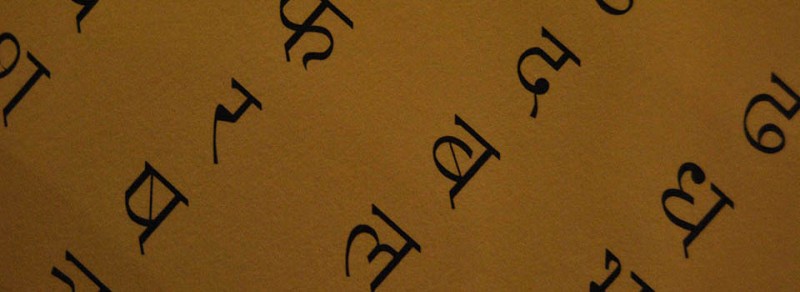A major modern South Asian language, Hindi is spoken and understood by more than half a billion people in India and in other parts of the world where the Indian diaspora has settled. The language is written in Devanagari, a script derived from the ancient Brahmi writing system.
Hindi is often presented as a relatively recent language. But like any modern language that evolves and is influenced by the people with whom it comes in contact, Hindi has been naturally shaped by the languages and cultures of the people that have lived, traded, and traveled across South Asia for at least the past 3000 years. The peoples living in the Indian subcontinent have engaged with their counterparts in other parts of the world—namely modern-day Iran, Greece, China, Portugal, and England—thanks to the trade of both goods and ideas. As a result of this tremendous enrichment by its dynamic historical past, Hindi has adopted a significant number of assimilated words from Sanskrit, Arabic, and Persian, and a more limited number of assimilated words from more divergent languages such as English, Portuguese, Turkish, Pashto, Tamil, French, Chinese, and Japanese.
The diversity and range of Hindi dialects is just as rich as the language’s past. Spanning across the Hindi Belt of northern and central India, considerable differences in sentence construction, vocabulary, idioms, and pronunciation between different regions are impossible to ignore. Even the distinction between the Hindi and Urdu in everyday conversation is not discernible by most people. The differences only become evident when comparing their formalized forms.
Take a look at the following selection of relatively common Hindi words that have similar cognates in other languages. The words are written in Devanagari, followed by Roman transliteration, and finally the nearest English translation in parentheses.
| Sanskrit धर्म dharm (Dharma) प्रभाव prabhāv (influence, effect) लोकतंत्र loktantrǎ (democracy) समाचार-पत्र samācār-patrǎ (newspaper) |
Arabic इश्क़ iśq (love, passion) किताब kitāb (book) दिमाग़ dimāg (brain, intellect) वकील vakīl (lawyer) |
Persian चालाक cālāk (crafty) ज़मीन zamīn (land) शानदार śāndār (spectacular) हिन्दी hindī (Hindi) |
| English टेन्शन ṭenśan (tension) नंबर nambar (number) प्राबलेम prāblem (problem) रोमांस romāns (romance) |
Portuguese अलमारी almārī (cupboard) कमरा kamrā (room) मिस्तरी mistrī (mechanic; carpenter) मेज़ mez (table) आम ām (mango) |
Turkish उर्दू urdū (Urdu) चाक़ू cāqū (knife) बहादुर bahādur (brave) बेगम begam (wife; queen) |
| Pashto अखरोट akhroṭ (walnut) गड़बड़ gaṛbaṛ (disorder) गुण्डा guṇḍā (a gangster, a hooligan) |
French अँग्रेज़ ãgrez (an Englishman) कारतूस kārtūs (a rifle cartridge) |
Tamil पिल्ला pillā (puppy) |
| Chinese चाय cāy (tea) लीची līcī (lychee) |
Japanese रिक्शा rikśā (rickshaw) |
An introduction to the Hindi language for Hindi readers
लगभग ४० करोड़ लोगों की मातृ-भाषा, हिन्दी दुनिया की सब से वैज्ञानिक और असरदार भाषाओं में से एक है । देवनागरी लिपि में लिखी जाने-वाली एवं लगभग १७ बोलियों के रूप में बोली जाने वाली यह भाषा भारत की एक मानक भाषा होने के साथ-साथ राज-भाषा भी है । यह एक बहुत पुरानी भाषा है । बहुत सारे व्याकरण के जानकार एवं विद्वान इस भाषा का जन्म संस्कृत से मानते हैं एवं इस का विकास-क्रम “संस्कृत-पालि-प्राकृत-अपभ्रंश-अवहट्ठ-हिन्दी” मानते हैं ।
आधुनिक हिन्दी खड़ी बोली का विकास १९वीं शताब्दी के मध्य से शुरू होता है जब भारतेन्दु हरिश्चन्द्र, प्रतापनारायण मिश्र, बालमुकुंद गुप्त और चौधरी प्रेमनारायण “घन” ने इस भाषा में लिखना शुरू किया । यद्यपि उस से पहले लाला श्रीनिवास दास “परीक्षा-गुरु” जैसा हिन्दी का पहला उपन्यास लिख चुके थे एवं राजा शिवप्रसाद सिंह “सितारेहिंद” एवं राजा लक्ष्मण सिंह भी खड़ी-बोली हिन्दी में रचना कर चुके थे, परंतु खड़ी बोली हिन्दी को वास्तव में एक रूप एवं गति भारतेन्दु एवं उन के साथियों ने ही दी ।
हिन्दी भाषा की सब से बड़ी ख़ूबी उस की दूसरी भाषाओं से शब्द लेकर उसे अपना बना लेने की क्षमता है । उर्दू तो हिन्दी की बहन की तरह है और दोनों भाषाओं के बहुत सारे शब्द आपस में इस तरह घुल-मिल गए हैं कि आम बोल-चाल में लोग पहचान भी नहीं पाते कि कौन-सा शब्द किस भाषा का है ।
Read more by Zabaan:

